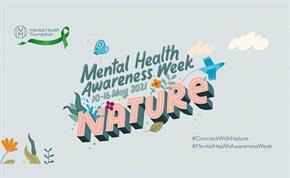
‘There is something to be wondered at in all of Nature’ - Aristotle
During long months of the pandemic, millions of us turned to nature. Research shows that going for walks outside was one of our top coping strategies and 45% of us reported being in green spaces had been vital for our mental health. Websites which showed footage from webcams of wildlife saw hits increase by over 2000%. Wider studies also found that during lockdowns, people not only spent more time in nature but were noticing it more.
It was as if we were re-discovering at our most fragile point our fundamental human need to connect with nature.
Not surprisingly then the theme for this year’s Mental Health Awareness Week is Nature and our mental health.
Nature is central to our psychological and emotional wellbeing. For most of our human history, we lived as part of nature and it is only in the last 100 years or so that our direction has changed. But now science is starting to unpack the extraordinary health benefits nature can bring: there is evidence of nature’s unique ability to not only bring consolation in times of stress, but also increase our creativity, empathy, sense of belonging and a sense of wonder.
Despite this, many of us are not accessing or benefitting from nature. Visit Mental Health Awareness Week 2021 to read more about what you can do to help yourself and others at this time.
Here are some tips you can try in the meantime to see if you can feel the benefit:
Why not take this week to see what you can do to feel the benefit of nature?
If you are feeling low, overwhelmed, and not sure where to turn for practical help and advice, try the EAP and see how it can help you find the balance you need.
Speak to someone you trust
Whether that’s family, friends, work colleagues or your line manager. You can also contact the EEAST Being Well Team: wellbeing@eastamb.nhs.uk
Call the Employee Assistance Programme (EAP) on 0808 196 2374.
You, or your immediate family, can contact the EAP to discuss all types of personal issues (financial, parenting, caring and so on), on a confidential basis.
Call the EEAST Crisis Line on 0808 196 2370
When life gets too tough: you don’t know what to do or who to turn to.
Published 11th May 2021